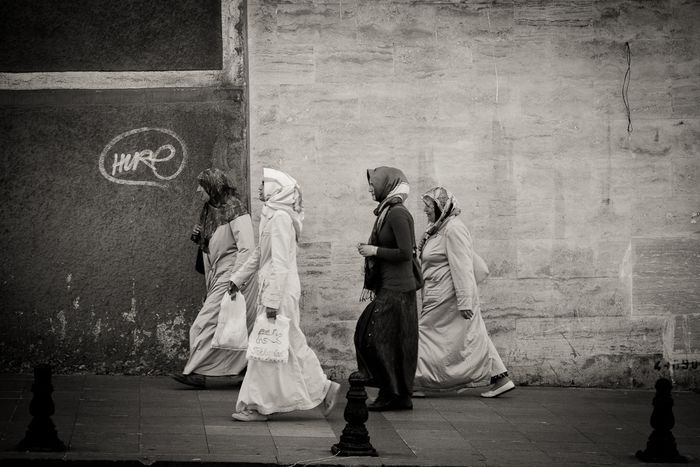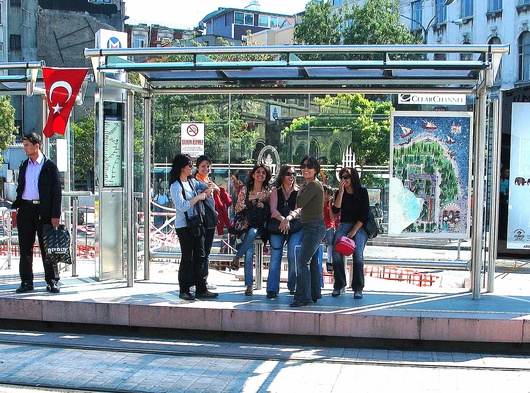
Women and secularism : the slow evolution of Turkish society
Published on
Translation by:
Emily SpencerThe second part of the interview with Seyma Gelen by Cafébabel Bruxelles. Feminist and researcher at l'Université Libre de Bruxelles, she talks to us about the civil and social rights of Turkish women, Erdoğan and secularism.
A researcher in transnational electoral sociology, Seyma Gelen combines European awareness with the insight of a Turkish woman, to discuss the coming challenges and slow transformation of an unequal system. This is the second part of the interview with the young researcher, by cafébabel.
(The first part of the interview can be found here: The ongoing struggle for women's rights in Turkey.)
cafébabel: Do you think that the re-election of Mr. Erdoğan was politically engineered and what impact do you think it could have on the social and political rights of women?
Seyma Gelen: He and his party were re-elected because it made sense for the majority of the Turkish population. However, the election took place against a backdrop of political instability, which drove many citizens to seek a single party government, that could re-establish a certain degree of stability. What am I expecting the impact of this to be on the social and political rights of women? Certainly, I know that, as long as the population – male or female – does not address the issue and does not discuss it in a way that puts pressure on leaders, real equality will never be achieved. The AKP strives above all, for ‘legal’ equality. In 2004, in a bid to join the EU, and yielding to the pressure of dozens of feminist organizations, the AKP amended Article 10 of the Constitution of Turkey, banned discrimination based on sex, and reformed the penal code; redefining 'crimes towards women' as 'crimes against humanity'. Article 5 of the Labour Code guarantees the principle of equal treatment of men and women. The legal framework in itself is a step in the right direction.
cafébabel: What observation do you make of the significant gap that still exists between secularists and Islamic women in Turkey? Do you agree with the notion of polarisation within Turkish society, especially after the last elections?
Seyma Gelen: Providing a response to this question isn’t simple and requires an entire article in itself! The female body has been a political battleground since the creation of the Republic. At the time, the idea was to re-invent the Turkish woman, presenting her as being liberated from the Muslim past, and emancipated, by virtue of Western values. Those who covered their hair were barred entry to higher education and employment, while women who didn’t, were granted access. Despite this discrimination, practicing Muslim women who wore the headscarf and those who didn’t, did not clash with one another over the issue. Nowadays, even though the recent case of the headscarf-clad judge outraged some people, there is no disagreement on the issue. All women, whether or not they wear a headscarf, have access to the job market and an education. The presence of one does not inhibit the presence of another. I do not agree with the dichotomous classification of ‘Islamic women and secular women’ - it is not appropriate. Besides, what do these categories even mean? If, by Islamic women you mean 'women who wear the hijab', the latter also become increasingly secularized, leading a life similar to those who don’t wear it. There is no clear delineation between the two groups.
 However, it isn’t hard to imagine that there are some women – and men! – who feel threatened by the public visibility of women wearing the headscarf – in the same way, that there are women – and men – who don’t want to see women without the headscarf. Extremes exist everywhere. Certainly, there have been famous women, musicians or actresses for example, who recently publicly expressed that they were against the wearing of headscarves. We must not ignore this, even if it is only a minority point of view. However, we're not just talking about a split between women who wear the hijab and women who don't, but a polarisation between opponents and supporters of Erdoğan. Both practising and non-practising Muslim women – can find themselves on the same side. What is beneficial about such polarisation is that people who come from different backgrounds are starting to talk to one another and to understand one another, which was almost unimaginable before! Take, for example, leftist groups who don’t support the AKP, who managed to communicate and understand each other. The opposite is also true; none of Erdogan's supporters wear the headscarf.
However, it isn’t hard to imagine that there are some women – and men! – who feel threatened by the public visibility of women wearing the headscarf – in the same way, that there are women – and men – who don’t want to see women without the headscarf. Extremes exist everywhere. Certainly, there have been famous women, musicians or actresses for example, who recently publicly expressed that they were against the wearing of headscarves. We must not ignore this, even if it is only a minority point of view. However, we're not just talking about a split between women who wear the hijab and women who don't, but a polarisation between opponents and supporters of Erdoğan. Both practising and non-practising Muslim women – can find themselves on the same side. What is beneficial about such polarisation is that people who come from different backgrounds are starting to talk to one another and to understand one another, which was almost unimaginable before! Take, for example, leftist groups who don’t support the AKP, who managed to communicate and understand each other. The opposite is also true; none of Erdogan's supporters wear the headscarf.
cafébabel: Is the fight for civil rights unique to secular and republican parties’ agendas or is it something that all parties strive for?
Seyma Gelen: The specific rights of women started being discussed during the Tanzimat (a time of reforms in the Ottoman Empire, in the 19th century). Even then, feminist organisations and feminist personalities were pursuing the subject. Women's rights isn’t a recent issue. The kemalist Republic made women's rights a political matter of modernisation, only concerning the middle and upper classes of the population. Women who conformed to the kemalist ideal were able to infiltrate different sectors. Nowadays, the gap between norms and practices distinguishes The Republican People's Party from the party or parties leading the country. It is a state built on the ashes of an empire, characterised by top-down modernisation, where the differences between what the elites want and what the population want are significant. That’s why today the question of women’s rights is a subject that is hardly debated in Turkey. The economy and security worry its citizens much more than the rights of women does. That said, almost all of the parties in Turkey discuss women's rights to some extent nowadays, in line with their ideologies, particularly the AKP and the HDP.
Translated from Femmes et laïcité : les évolutions lentes de la société turque



